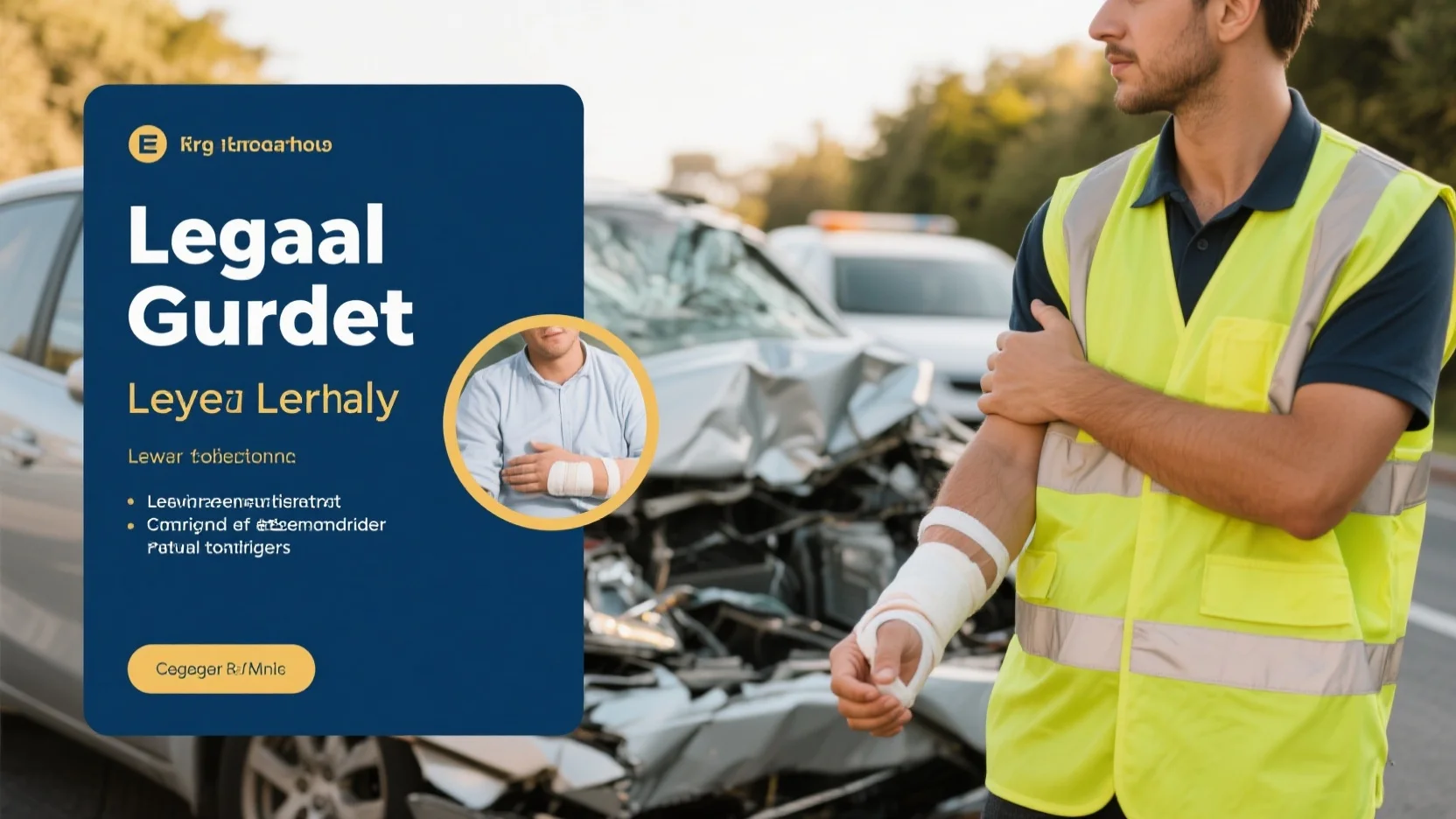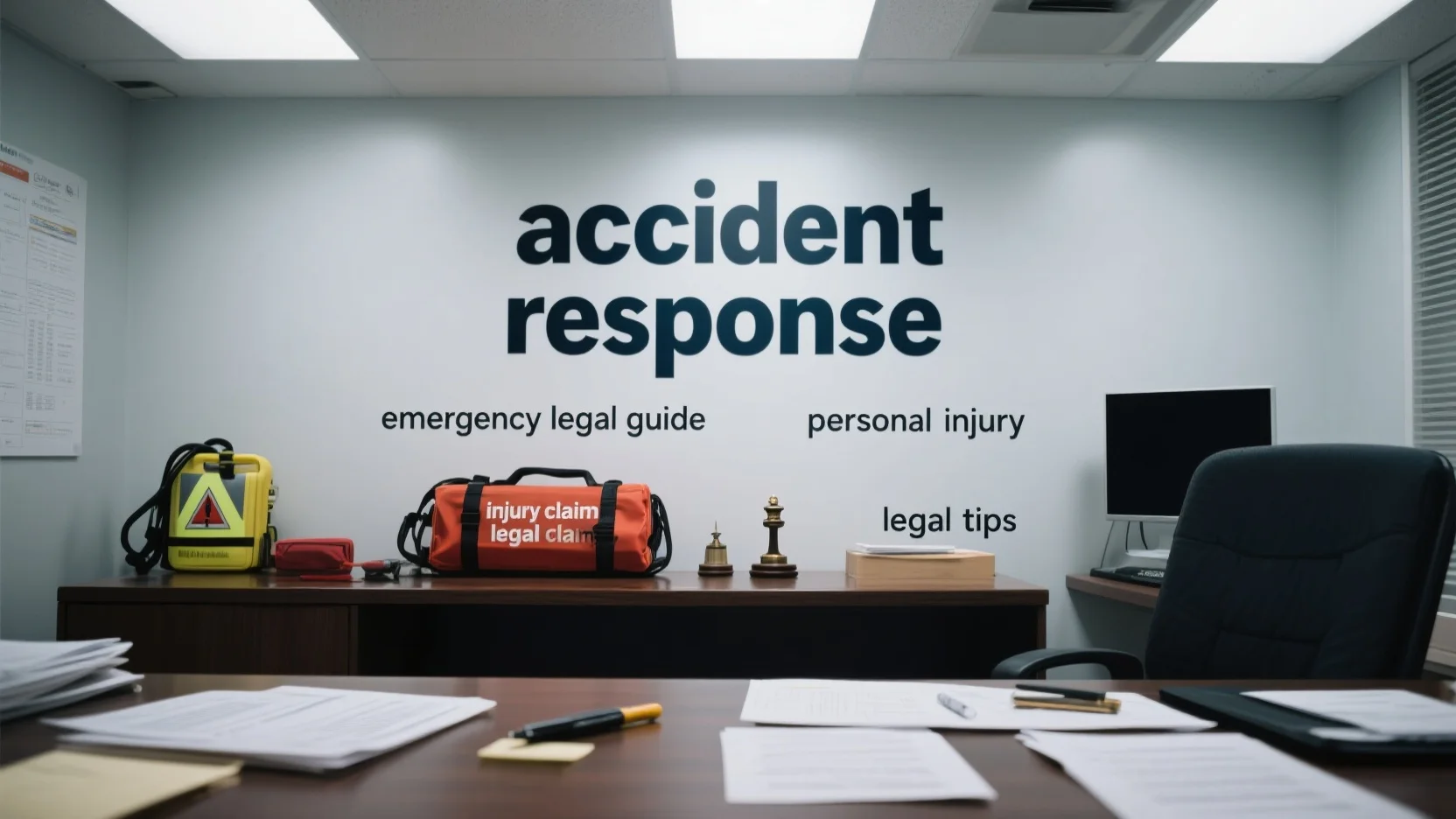
Image Source: pexels
Accidents can surprise you and cause stress. That’s why having an ‘Emergency Legal Guide for Accidents: The Right Steps to Take Immediately’ is crucial. It is important to act fast to stay safe and protect your rights. Collect proof, get medical help, and know your choices. This guide helps you stay ready and know what to do in accidents.
Key Takeaways
- Safety comes first after an accident. Go to a safe spot and check for injuries before calling for help.
- Record everything at the scene. Take pictures, get witness contact details, and write down things like time and weather.
- Get medical help right away, even for small injuries. Quick care helps you heal and strengthens your legal case.
Immediate Actions After an Accident
Keep Everyone Safe and Move Away from Danger
The first thing to do is make sure everyone is safe. If possible, move yourself and others to a safer spot. Stay away from traffic or anything dangerous. Being in harm’s way can make things worse. Experts say safety should always come first.
Look for Injuries and Call for Help
Check if anyone is hurt. Even small accidents can cause hidden injuries. Always call 911 for help. Paramedics can check injuries on the spot. Their reports might be useful later. If someone is badly hurt or unconscious, don’t move them unless there’s a serious danger.
Tell the Police About the Accident
Always let the police know about the accident. This step creates an official report. Without it, proving what happened can be hard. Witnesses might forget, and insurance companies could argue. A police report gives clear details that help with claims or legal issues.
Don’t Admit Fault or Say Too Much
Never say it’s your fault or talk too much at the scene. Even saying "I’m sorry" might sound like you’re admitting guilt. Just share your contact and insurance details with others. Stick to facts and avoid blaming anyone to protect your rights.
Tip: Stay calm and polite when talking to others. Getting upset can make things harder.
Documentation Essentials
Take Photos and Videos of the Scene
Take pictures and videos of the accident right away. Use your phone to show damage, injuries, and dangers like broken glass. Snap wide shots to show the whole area. Take close-ups for small details. These images can explain what happened and help your case later.
Tip: Include traffic signs, signals, or road conditions in your photos.
Collect Contact Information of All Parties and Witnesses
Get names, phone numbers, and addresses from everyone involved. Ask witnesses for their details too. If you can, take a photo of their driver’s license or insurance card. Witnesses can share what they saw, which may help your claim.
Note: Be polite when asking for information. People cooperate more when treated kindly.
Record Details of the Accident (Time, Location, Weather Conditions)
Write down everything about the accident while it’s fresh. Note the time, place, and weather. Include things like where cars were going and unusual issues like bad visibility. These notes can help you explain the accident later.
Pro Tip: Use your phone’s voice recorder or notes app to save details quickly.
Medical Care

Image Source: unsplash
Get Medical Help Right Away
After an accident, always see a doctor quickly, even for small injuries. Some problems, like whiplash or internal bleeding, might not show up right away. Waiting to get treated can make things worse, like causing long-term pain or serious health issues. Also, insurance companies may doubt your injuries if you delay care. They could say the accident didn’t cause them. Seeing a doctor fast helps keep you healthy and supports your legal case.
Tip: Ask for a copy of your medical report. It’s important proof for your case.
Watch for Symptoms and Visit Your Doctor Again
Pay close attention to how you feel after an accident. New problems, like headaches or dizziness, might show up later. These could mean something serious, like a concussion. Go back to your doctor for check-ups to make sure you’re healing well. Regular visits also show how your injuries change over time, which helps your legal claim. Ignoring symptoms or skipping visits can hurt your case and your health.
Keep All Medical Papers Organized
Save all your medical papers, like bills, prescriptions, and test results. These show how much the accident has cost you and how it has affected your life. They also help figure out fair compensation for your injuries. Keeping everything in order makes it easier to explain your case if you need a lawyer.
Note: Use a folder or app to safely store your medical papers.
By doing these things, you protect your health and your legal rights. The "Emergency Legal Guide for Accidents: The Right Steps to Take Immediately" shows how important it is to act fast, and getting medical care is a big part of that.
Talking to Insurance Companies
Tell Your Insurance Company Quickly
Let your insurance company know about the accident right away. Waiting too long can cause big problems. For example:
- Important proof might get lost, and witnesses could forget details.
- Insurance companies might claim your injuries weren’t from the accident.
- It may become harder to prove your case later.
In Progressive Mt. Ins. Co. v. Vining, the court said telling your insurer quickly is key to keeping coverage. Not doing this could hurt your claim.
Acting fast helps your insurance company handle your claim properly.
Be Careful What You Say to Insurance Companies
Be very careful when talking to insurance companies. Don’t give recorded statements or share too much information. Only talk about the facts and wait to discuss injuries until after seeing a doctor. Many people say too much, which can hurt their case.
- Don’t agree to a recorded statement without asking a lawyer first.
- Don’t guess who caused the accident or how bad your injuries are.
- Keep your answers short and stick to the facts.
Insurance adjusters often try to pay less, so choose your words wisely.
Don’t Take Quick Settlements Without Legal Help
Some people take quick settlement offers and regret it later. These offers often don’t cover all the costs of injuries or damages. Before saying yes to any offer, talk to a personal injury lawyer. They can check if the offer is fair and help you get what you deserve.
Tip: A lawyer can also handle talks with the insurance company for you.
The "Emergency Legal Guide for Accidents: The Right Steps to Take Immediately" reminds you to protect your rights. Without legal advice, you might end up with unpaid bills or not enough money for your losses.
Legal Considerations
Learn About Your Right to Compensation
After an accident, know your rights to get compensation. You might get money for medical bills, lost pay, or stress. Understanding this helps you avoid settling for too little. If someone else caused the accident, you could claim through their insurance or file a legal case. Many people miss out on money because they don’t know their options. Learning your rights is the first step to protecting them.
Talk to a Personal Injury Lawyer
It’s smart to talk to a personal injury lawyer after an accident. A lawyer can help with the legal process and deal with insurance companies for you. Research shows people with lawyers often get more money. For example, a University of Michigan study found workers with lawyers got much higher payouts. Another study in California showed medical cases with lawyers got 5.4 times more money. The table below shows these findings:
| Study Source | Compensation Increase | Notes |
|---|---|---|
| University of Michigan | Much higher | Workers with legal help got better payouts |
| Texas Bar Association | 2.4 times more | Injury cases with lawyers got more money |
| California Study | 5.4 times more | Medical cases with lawyers got more money |
| Lawyers.com | 91% received payout | Compared to 51% without a lawyer, even after fees claimants got three times more money |
These studies show how helpful lawyers can be. They make sure you don’t lose money you deserve.
Know Deadlines for Filing Claims
Every state has a time limit for filing accident claims. This is called the statute of limitations. If you miss it, you can’t get compensation. Act fast to avoid missing out. For example, many states give two years for personal injury claims, but this can change depending on the case. Talking to a lawyer early helps you meet deadlines and keep your rights safe.
These legal steps are very important. The "Emergency Legal Guide for Accidents: The Right Steps to Take Immediately" explains why knowing your rights, getting legal help, and acting on time matters. These actions protect your future and ensure fair treatment.
Acting quickly after an accident keeps you safe and protected. It’s important to take pictures, get medical help, and talk to a lawyer. Waiting too long can cause problems like low payouts or blame issues. A lawyer helps by checking your case and dealing with insurance companies. Acting fast can change everything.
Tip: Don’t rush into settlements. They may not cover all damages.
FAQ
What if the other driver won’t share their details?
Stay calm and don’t argue. Take pictures of their car and license plate. Call the police right away to report the problem.
Tip: Let the police deal with uncooperative drivers. Stay safe.
Can I file a claim if I didn’t feel hurt at first?
Yes, you can. Some injuries, like whiplash, show up later. Visit a doctor soon and write down any new symptoms after the accident.
Do I need a lawyer for every accident?
Not always. You can handle small accidents yourself. But for serious injuries or insurance problems, talk to a lawyer.
Note: Lawyers help you get fair payment in tough cases.


